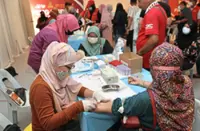PETALING JAYA: The country spent a whopping RM22.53bil to treat non-communicable diseases (NCD) such as diabetes, cancer and heart diseases among Malaysians in 2017.
This figure was revealed in a report titled “The direct healthcare cost of non-communicable diseases in Malaysia” released by the Health Ministry and the World Health Organisation (WHO) on Tuesday (Aug 9).





